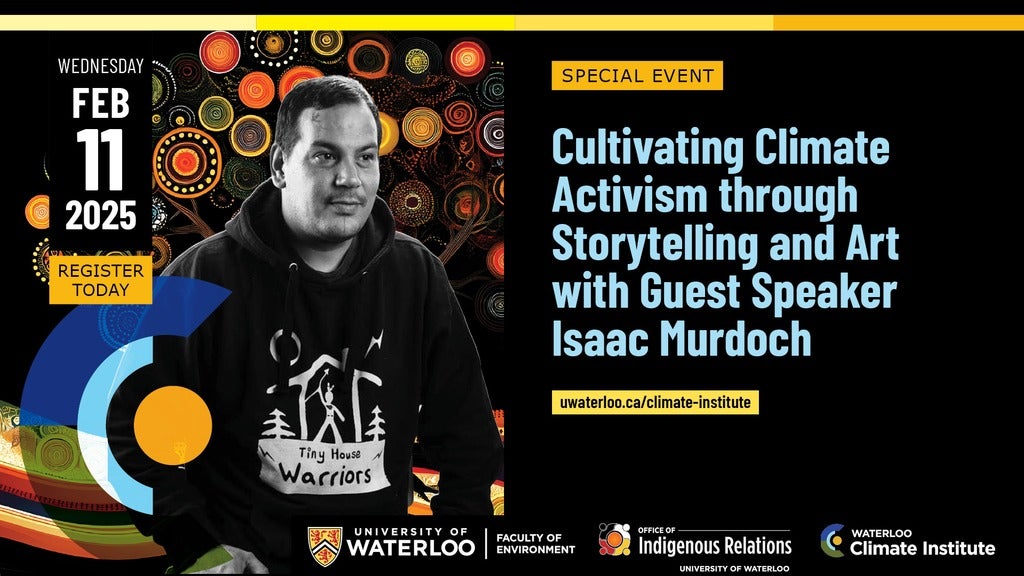The University of Waterloo Climate Institute brings together the research community and partners to advance strategic research and capacity building priorities at the local, national, and international scales. Our work empowers business, government and civil society to respond effectively to the climate crisis.
Based at the University of Waterloo, the Climate Institute harnesses a unique combination of strengths and depth of expertise to enhance the impact and excellence of innovative interdisciplinary research and education, and to deal head-on with the complexity and interconnectedness of social, political and technological dimensions of climate change.
Our key focus areas:

RESEARCH
Strategic research development and management across priority research areas (deep decarbonization and sustainability transitions, climate risks, resilience and adaptation; and climate science, modelling and observation).

TRAINING AND CAPACITY BUILDING
Supporting climate action through targeted professional development opportunities and the integration of climate education in academic programs.

KNOWLEDGE SHARING
Informing decision makers in policy, practice and innovation through tailored reports, briefs, facilitated workshops, data visualization, media engagement, and partnerships.
Learn more about the work at the Waterloo Climate Institute:

Municipal Climate Adaptation Certificate
Discover the Waterloo Climate Institute's new professional development opportunity, the Municipal Climate Adaptation Certificate. This forward-thinking initiative is funded by the Federation of Canadian Municipalities (FCM) and is designed specifically for municipal staff who are looking to strengthen their climate resilience skills.
News
Three experts advancing climate change at the highest level
Waterloo researchers are helping shape the next global scientific assessment that will guide world leaders from climate promises to action. These researchers are from the University of Waterloo’s Faculty of Environment and members of the Waterloo Climate Institute: Dr. Sarah Burch, Dr. Vanessa Schweizer and Dr. Andrew Trant. We caught up with them to learn their roles in producing the upcoming Seventh Assessment report, how it relates to their work at Waterloo and what keeps them motivated.
New Policy Brief Calls for Action to Protect Ontario’s Christmas Tree Industry from Climate Change Risks
A new policy brief from the Waterloo Climate Institute and the Christmas Tree Lab, led by Prof. Kelsey Leonard, highlights the need for climate resilience measures for Ontario’s Christmas tree industry. To ensure the industry’s long-term sustainability, the brief proposes five key action areas for all levels of government: upholding cultural heritage, aligning crop insurance policies to tree farming, addressing climate-driven pests and diseases, integrating Christmas tree farms into climate policy, and promoting post-holiday tree recycling.
AI’s energy usage is less than previously thought
Contrary to popular belief, new research finds that the use of artificial intelligence has a minimal effect on global greenhouse gas emissions and may actually benefit the environment and the economy. For their study, researchers from the University of Waterloo – Waterloo Climate Institute member Prof. Juan Moreno-Cruz – and the Georgia Institute of Technology combined data on the U.S. economy with estimates of AI use across industries to determine the environmental fallout if AI use continues its current trajectory.
Events
Cultivating Climate Activism through Storytelling and Art with Guest Speaker Isaac Murdoch
Join us for an inspiring event centered on Indigenous knowledge, storytelling, and climate activism, with special guest Isaac Murdoc. The event will open with a keynote address by Isaac, followed by a thoughtful conversation between Isaac and University of Waterloo’s Elder Myeengun Henry and Amanda St. Marie.





